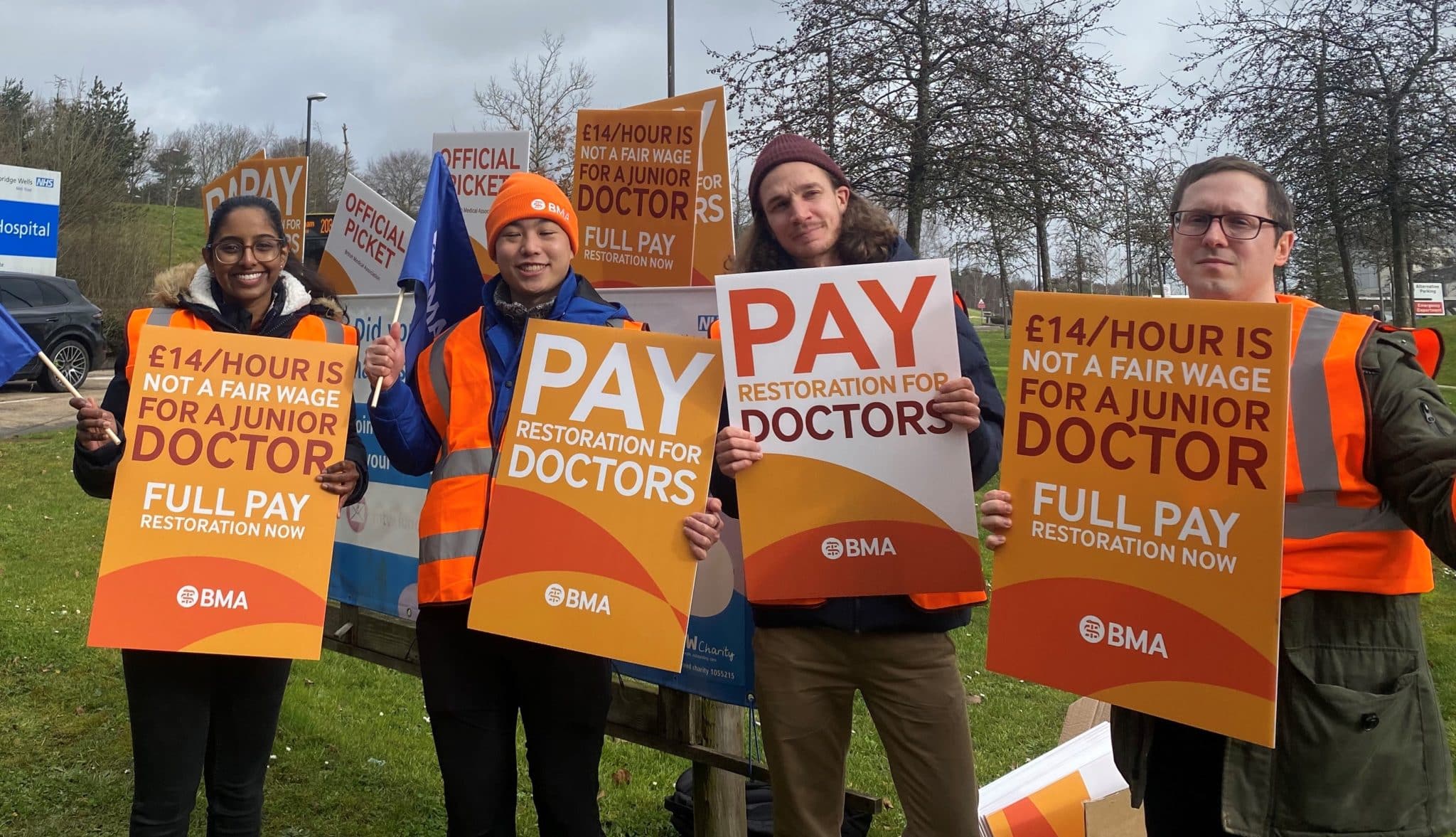Junior doctors at Tunbridge Wells hospital will be walking out again today, March 15, in their third day of strikes over pay and working conditions.
The action is part of a 72-hour national strike by the British Medical Association (BMA) who are demanding a 35 per cent pay rise, which they hope will achieve full pay restoration to 2008/09 levels.
Junior doctors have been on the picket lines outside Tunbridge Wells and Maidstone Hospitals since Monday, March 13, to campaign for better working conditions and salaries as they feel ‘underpaid and undervalued’.
Dr Ishani Rao, a final-year junior doctor at Maidstone and Tunbridge Wells NHS Trust (MTW), told the Times: “I am striking to show solidarity with my colleagues who are not paid enough, supported by the government, or respected by the patients.
“I love working in emergency medicine and MTW is the best A&E, but we are starting to feel the pressure from being short-staffed, inadequate equipment or it being in the wrong place, and working extra shifts and overtime.
“The pay is not fair for the job we do but it’s not just about the money; we want better support, time off and equipment.
“Doing medical on call, I was working 13-hour shifts, four nights in a row. I felt exhausted because we were constantly short-staffed, sometimes we would only have two doctors. We would often admit defeat before we went in that night.”
Another junior doctor from MTW, who chose to remain anonymous, told the Times: “It’s more than just pay and working conditions, it’s a complicated issue. It’s about how we are treated as individuals, the rotational aspect of the job and the day-to-day challenges.
“You choose to do this job from when you are 16 and it is what you expect but what you’re not prepared for is how indispensable you feel.”
On the picket line at Tunbridge Wells hospital, members of the public came out in support of junior doctors.
Steve Lane who has been having treatment at the hospital told the Times: When I came in one morning last week, I was greeted at the door by a triage nurse and a doctor and for various reasons I was there till late at night where the same people were behind reception and the same doctors, same nurses were there over 12 hours later, it was shocking.”
His partner, Lynne Lane also told the Times: “We want these people to get a decent wage, they are working 72 hours a week not getting paid properly and not working in good conditions and they are moving around the country for their training.
“I am concerned that the doctors who we are training are giving up and going abroad for better conditions and salaries.”
The BMA has said the lack of investment in wages has made the recruitment and retainment of doctors harder, putting pressures on the NHS to deliver care to the same professional standards.
According to a survey by the BMA, one in four doctors plan to leave the NHS once they have found a new job with a third planning to work as a doctor in another country with the most popular destination being Australia.
The strikes are expected to conclude tomorrow (March 16) at 7am, when junior doctors will resume attending shifts, but Kent and Medway NHS Trust have warned patients ‘use services wisely’ and to attend appointments unless told otherwise.
The Trust said: “Unfortunately, people can expect a significant impact to health services in Kent and Medway during industrial action planned by junior doctors.
“All areas of the NHS are expected to be affected from 7am on Monday, 13 to 7am on Thursday, 16 March. Please use services wisely, we are working with partners to make sure patients receive care in a safe environment.
“People should use 111 online as the first port of call for health needs and only use 999 if it is a life-threatening emergency. Mental health crisis services can be accessed through normal routes.
“Our emergency departments continue to face high demand and we expect resources to be stretched further during this industrial action. Please only go to our emergency departments if you are facing life threatening injury or illness.
“Care is available across Kent and Medway through other NHS services, including urgent treatment centres and pharmacies. Please use these for less urgent health needs.
“Please go any planned appointment as normal unless you hear otherwise. If industrial action means your appointment has to be cancelled, your hospital, GP or other provider will directly contact you to make alternative arrangements.”
NHS Kent and Medway’s Chief Medical Officer Kate Langford said: “We are working closely with our partners to make sure patients can access the care they need, in a safe environment, during industrial action by junior doctors.
“We anticipate and are planning for the action to have significant impact on services provided across all areas of the NHS, including our hospitals, accident and emergency departments, primary care (GP practices) and mental health services.
“Regardless of any strike action taking place, it is important patients who need urgent medical care continue to come forward as normal, especially in emergency and life-threatening cases – when someone is seriously ill or injured, or their life is at risk.’’








